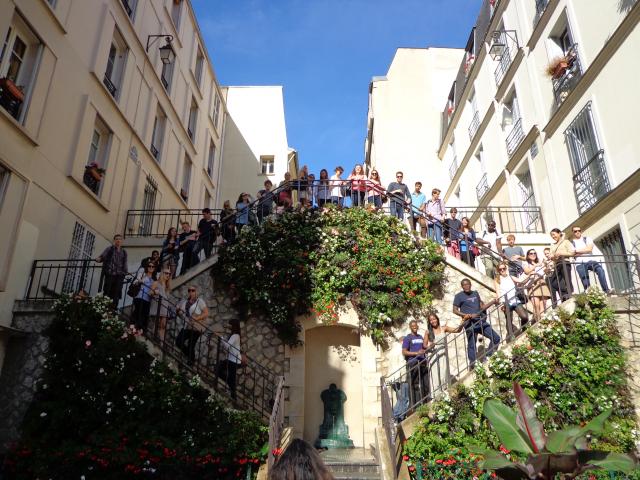The room was unusually quiet given that we had a couple of minutes before the end of class. My blue-black backpack, the one I used on my travels around Europe, was on the chair next to me. It was covered with my to-fit jacket and long dark blue scarf, some of the very few items I purchased from a shop on Rue General Leclerc, having become accustomed to the sense of fashion in this part of the world.
Students Gabe, Marco, and Ashley, just to mention a few, flanked the class space. Gabe, my favorite ginger kid from Los Gatos, California, is a political science student at the University of Redlands. Marco, an Italian-Brazilian whose love for everything Brazil was no secret to the rest of us, is a business student at Wake Forest University. Ashley, an outgoing girl with a just-enough sense of adventure and who would give audience to my occasional peccadillos, is from Kentucky and is a mass communications student at Washington and Lee University. These were but a few of the other American kids enrolled in my French class in the Paris Business and International Affairs (BIA) Program in the Fall of 2012.
Of course, in a French class in France, one would expect an average-height, bearded monsieur with a happy moustache (on a good day), wearing a beret, and holding a baguette, to say the least. However standing in front of us behind the blackboard is a tall monsieur, Baptiste Lebreton, who challenges his students and is himself a little hipster. After all, one cannot teach French culture without touching on things in vogue in France. Baptiste is none of what I described—well, except for his beard and understandable French accent. In fact, if there was one thing he, perhaps unknowingly, did very well, it is that he disproved most of the French stereotypes. This quality of his was no longer surprising, after I learnt that he is well travelled, having taught in Asia, America, and other regions of the world.

Baptiste turned to us and remarked, “Il faut que vous compreniez les significations des noms des gens Français.” Meaning, "it is important that we know the meanings of some French names." In this light, our assignment that day was to research the meaning of some French surnames. As I reminisce this assignment, my classmates, and that day, I find very interesting similarities between French and English names. I realize that Boulanger, Messager and Charpentier, for instance, are the French equivalents of our Bakers, Messengers and Carpenters.
Also, these names sometimes come from the occupation of families and their geographical location. In his example to the class, Baptiste noted that the name “LeBreton” refers to a person from Brittany, a region in northwestern France, about two hours from Paris by train. For those from Africa, it may sound all too interesting, the fact that the days of the week, being twins, being the first or last kid, and one’s clan, are a few of the factors which may determine what name one is given.
Thanks for reading.

